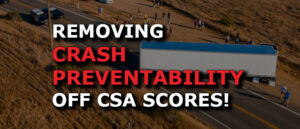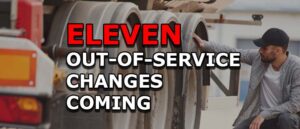How Fleets Can Easily Remove Crash Preventability Off CSA Scores
CNS can help with our Roadside & Incident Report Management service where a team of DOT Compliance Specialists will assess the Department of Transportation safety records
We are a team of DOT Compliance and Licensing Professionals helping trucking and transportation companies remain safe, compliant, and profitable.
CNS or Compliance Navigation Specialists is DOT Compliance company that assists trucking and transportation companies remain DOT Compliant. We are part of a network of companies, CNS Companies, specializing in services related to the transportation, manufacturing, construction, service, education and medical industries.

A full-scale DOT Compliance Program managing a long haul carrier’s safety, compliance, licensing and more.
Learn more >>>
A DOT Compliance Program that keeps motor carriers compliant with the 6 Basic DOT Regulations required of all carriers.
Learn more >>>
Our Short-Haul/Construction Program is a full-scale program designed for private carriers that do not haul for-hire.
Learn more >>>
Our most comprehensive DOT Compliance Program, operating as your company’s off-site Safety Director or assisting your current safety personnel.
Learn more >>>
Our Non-CDL Program is a full-scale program managing safety, compliance, licensing and more for moving companies, couriers, landscapers, or any company subject to DOT regulations and does not employ CDL drivers.
Learn more >>>
Our DOT Audit Services cover a number of different types of DOT Audits that new and existing carriers will be subject to.
Our DOT Driver Services help trucking companies and carriers to stay compliant as they grow and hire more drivers.
Our DOT Vehicle Services focus on ensuring your vehicles are compliant with DOT Regulations, which is just as important as your drivers.
Our DOT Services for Special Carriers focus on companies outside of the typical motor carrier, like HAZMAT, Passenger and Bus Carriers.
CNS is part of a group of companies that offer other necessary services for the trucking and transportation industry, such as Commercial Trucking Insurance, CDL Training, Online Training Course, and even Healthcare.
Our DOT Licensing Services will cover you whether you are an existing company or just starting a trucking company. Our DOT Licensing Specialists can help you get up and running and in days with your DOT number, MC Authority, EIN, UCR, IFTA, 2290 HVUT, Fuel Taxes and can even set you up to get your Commercial Driver's License (CDL) with CNS Driver Training Center.
Our DOT Licensing Specialists will help you with every aspect of starting a trucking company. All you need to do is choose a name for your trucking company.
You will need to ensure your DOT Number, MC Authority, Vehicle Registration, etc. is all set up properly when you start your trucking business.
Our Licensing Specialists can help with all aspects of filing and renewing licenses, fuel taxes, etc.
CNS is part of a group of companies that offer other necessary services for the trucking and transportation industry, such as Commercial Trucking Insurance, CDL Training, Online Training Course, and even Healthcare.
CNS can help with our Roadside & Incident Report Management service where a team of DOT Compliance Specialists will assess the Department of Transportation safety records
CNS or Compliance Navigation Specialists is DOT Compliance company that assists trucking and transportation companies remain DOT Compliant. We are part of a network of companies, CNS Companies, specializing in services related to the transportation, manufacturing, construction, service, education and medical industries.
CNS Companies is a network of companies specializing in services related to the transportation, manufacturing, construction, service, education and medical industries. Our DOT Compliance division is handled by Compliance Navigation Specialists, CNS Insurance handles Commercial Truck Insurance, CDL training is managed by the CNS Driver Training Center and healthcare is managed by CNS Occupational Medicine.
We are a team of DOT Compliance and Licensing Professionals helping trucking and transportation companies remain safe, compliant, and profitable.
CNS or Compliance Navigation Specialists is DOT Compliance company that assists trucking and transportation companies remain DOT Compliant. We are part of a network of companies, CNS Companies, specializing in services related to the transportation, manufacturing, construction, service, education and medical industries.

A full-scale DOT Compliance Program managing a long haul carrier’s safety, compliance, licensing and more.
Learn more >>>
A DOT Compliance Program that keeps motor carriers compliant with the 6 Basic DOT Regulations required of all carriers.
Learn more >>>
Our Short-Haul/Construction Program is a full-scale program designed for private carriers that do not haul for-hire.
Learn more >>>
Our most comprehensive DOT Compliance Program, operating as your company’s off-site Safety Director or assisting your current safety personnel.
Learn more >>>
Our Non-CDL Program is a full-scale program managing safety, compliance, licensing and more for moving companies, couriers, landscapers, or any company subject to DOT regulations and does not employ CDL drivers.
Learn more >>>
Our DOT Audit Services cover a number of different types of DOT Audits that new and existing carriers will be subject to.
Our DOT Driver Services help trucking companies and carriers to stay compliant as they grow and hire more drivers.
Our DOT Vehicle Services focus on ensuring your vehicles are compliant with DOT Regulations, which is just as important as your drivers.
Our DOT Services for Special Carriers focus on companies outside of the typical motor carrier, like HAZMAT, Passenger and Bus Carriers.
CNS is part of a group of companies that offer other necessary services for the trucking and transportation industry, such as Commercial Trucking Insurance, CDL Training, Online Training Course, and even Healthcare.
Our DOT Licensing Services will cover you whether you are an existing company or just starting a trucking company. Our DOT Licensing Specialists can help you get up and running and in days with your DOT number, MC Authority, EIN, UCR, IFTA, 2290 HVUT, Fuel Taxes and can even set you up to get your Commercial Driver's License (CDL) with CNS Driver Training Center.
Our DOT Licensing Specialists will help you with every aspect of starting a trucking company. All you need to do is choose a name for your trucking company.
You will need to ensure your DOT Number, MC Authority, Vehicle Registration, etc. is all set up properly when you start your trucking business.
Our Licensing Specialists can help with all aspects of filing and renewing licenses, fuel taxes, etc.
CNS is part of a group of companies that offer other necessary services for the trucking and transportation industry, such as Commercial Trucking Insurance, CDL Training, Online Training Course, and even Healthcare.
CNS can help with our Roadside & Incident Report Management service where a team of DOT Compliance Specialists will assess the Department of Transportation safety records
CNS or Compliance Navigation Specialists is DOT Compliance company that assists trucking and transportation companies remain DOT Compliant. We are part of a network of companies, CNS Companies, specializing in services related to the transportation, manufacturing, construction, service, education and medical industries.
CNS Companies is a network of companies specializing in services related to the transportation, manufacturing, construction, service, education and medical industries. Our DOT Compliance division is handled by Compliance Navigation Specialists, CNS Insurance handles Commercial Truck Insurance, CDL training is managed by the CNS Driver Training Center and healthcare is managed by CNS Occupational Medicine.

If you’ve got the vision and desire to start a trucking company, now is the time to make that vision reality. Starting any new business can be expensive and time-consuming. You don’t want to get overwhelmed by the paperwork and documentation before you even pick up a load.
That’s where CNS can help! As a leader in the trucking industry, we’ve helped many trucking startups and know what makes new companies successful. We’ve outlined the basic steps you’ll need to take to start a trucking company.
Our specialists can help you avoid getting bogged down in forms, because we take time to learn about your operation and help you become DOT compliant from the start. We won’t over-sell unneeded items or services that don’t ultimately help you get your business on the road.
Let us help you get started.
A solid business plan will list expenses and revenue expected in your business. Be sure to include your own salary. Costs involved in a trucking startup include tractors, trailers, licensing, and registration costs. Also include the cost of insurance, and data tracking software and services.
The U.S. Small Business Administration website has downloadable templates to create your own business plan.
You may want a sole proprietorship, a partnership, or a limited liability company. Each of these has pros and cons, which vary by state.
To own and run a private company in the United States, you’ll need to form a limited liability company (LLC). This is a business structure that combines pass-through taxation (like a partnership or sole proprietorship), with the limited liability of a corporation.
CNS can prepare and file your LLC application with your home state. Or if you want to start a partnership or sole proprietorship, click here.
This unique nine-digit number gets assigned to businesses in the United States by the Internal Revenue Service. Use this number to file your business tax returns.
CNS can obtain your EIN on your behalf. Click here to begin obtaining a Federal EIN.
First be sure you even need a USDOT number. Obtaining a USDOT Number can be confusing and costly. Here’s where CNS can help by getting your number quickly and accurately. Click here to learn more.
Companies are required to have interstate operating authority (MC Number) in addition to the DOT Number if they do any of the following tasks:
CNS can file for your MC Number at the same time we apply for your DOT Number.
A BOC-3 is a required United States filing that activates your Motor Carrier Authority. This filing assigns legal agents in the event court papers ever need to be served to your company by an outside state. It is required before federal operating authorities can be granted in the U.S.
CNS, unlike many of our competitors, does not charge an annual fee for a BOC-3 filing.
You may need to apply for further credentials if your company drives in the following states:
A trucking startup needs to be aware of special tax codes and procedures in accordance with State, District of Columbia, Canadian, and Mexican law. When a vehicle has a taxable gross weight of 55,000 pounds or more, the company has to electronically file a HVUT Form 2290.
Once this is filed, you will need to get a stamped copy of your Schedule 1. Companies are required to file all taxable highway motor vehicles registered in your name during the tax period when the truck first operated.
CNS can file your Schedule 1 with the IRS and provide you a stamped E-File copy. Click here to learn more.
The Unified Carrier Registration (UCR) program requires ALL carriers (private, exempt, or for hire) to register their business with a participating state and pay an annual fee that is based on the size of their fleet.
Brokers, freight forwarders, and leasing companies also are required to register and pay a fee, unless they are also operating as a motor carrier.
CNS can complete your UCR filing after you obtain your DOT number. Click here to learn more.
This agreement is between the lower 48 states and Canadian provinces and it simplifies reporting of fuel use by motor carriers operating in multiple jurisdictions. Alaska, Hawaii, and Canadian territories do not participate.
An operating carrier with IFTA receives an IFTA license and two decals for each qualifying vehicle. The carrier files a quarterly fuel tax report. This report determines the net tax or refund due and redistributes taxes from collecting states to states where it is due.
This registration gives reciprocity between the United States and Canada without the need for additional registrations. Under this Plan, only one license plate and one cab card is issued for each fleet vehicle.
Great job! Taking these steps gives you DOT and Operating authority. Now you need to become compliant with the FMCSA. These items need to be maintained through the year.
CNS has reliable, cost-effective packages that keep you compliant and up-to-date.
Different types of insurance are available and often required to cover certain aspects of your trucking company.
CNS partners with premiere truck/passenger insurance agencies to obtain the best coverage at affordable rates. Click here to learn more.
Trucking companies need to keep impeccable records in the event of an audit. Physical or electronic driver files allow you to pull an MVR report, look at previous employer inquiries, PSP reports and more.
CNS has solutions to keep your Driver Qualification Files up to date with regulations and ready to help you pass an audit. All of our driver files are monitored by actual DQF specialists to ensure documents don’t expire. We communicate personally about soon-to-expire materials to avoid computer overlooks. Click here to learn more.
Anyone holding a Commercial Driver’s License needs to have a pre-employment drug test and be enrolled in a DOT drug and alcohol consortium.
CNS offers a low-cost, DOT-compliant service that covers DOT random testing through the year. Our service gives you a secure portal to track test results. We also have personal representatives to call when you have questions. Click here to learn more.
Per a 2017 Electronic Logging Device mandate, non-exempt carriers are required to install an FMCSA-registered and compliant electronic logging device.
Today’s ELDs can actually help you grow your business. ELDs offer many fleet management features like diagnostic tools and advanced reporting. With their reports, you can maximize your fleet efficiency and simplify your operations.
We at CNS are excited for your new venture to become reality. We’re here to help you navigate the path towards starting a trucking company.
Our services and compliance specialists are on hand to get you up and running as quickly as possible.
SOURCES:
http://www.getloaded.com/get-authority/how-to-start-a-trucking-business
https://keeptruckin.com/blog/cheat-sheet-starting-trucking-business/

CNS can help with our Roadside & Incident Report Management service where a team of DOT Compliance Specialists will assess the Department of Transportation safety records

Do you travel in or through British Columbia, Canada? There is now a speed limiter requirement affecting most heavy trucks, as of Friday April 5,

FMCSA wants to completely overhaul its verification processes and improve the customer experience; and this includes ending MC numbers. The trucking industry has known about

If your lights aren’t on at night, but they work, that’s no longer an OOS violation, though it’s still a violation of state laws to
Our DOT Compliance Programs ensure it is your top priority and keeps your business running.
Receive the latest transportation and trucking industry information about FMCSA and DOT Audits, Regulations, etc.

CNS can help with our Roadside & Incident Report Management service where a team of DOT Compliance Specialists will assess the Department of Transportation safety records

Do you travel in or through British Columbia, Canada? There is now a speed limiter requirement affecting most heavy trucks, as of Friday April 5,

FMCSA wants to completely overhaul its verification processes and improve the customer experience; and this includes ending MC numbers. The trucking industry has known about
Join our monthly newsletter and stay up-to-date on trucking industry news and receive important compliance and licensing tips.
Join our monthly newsletter and stay up-to-date on trucking industry news and receive important compliance and licensing tips.